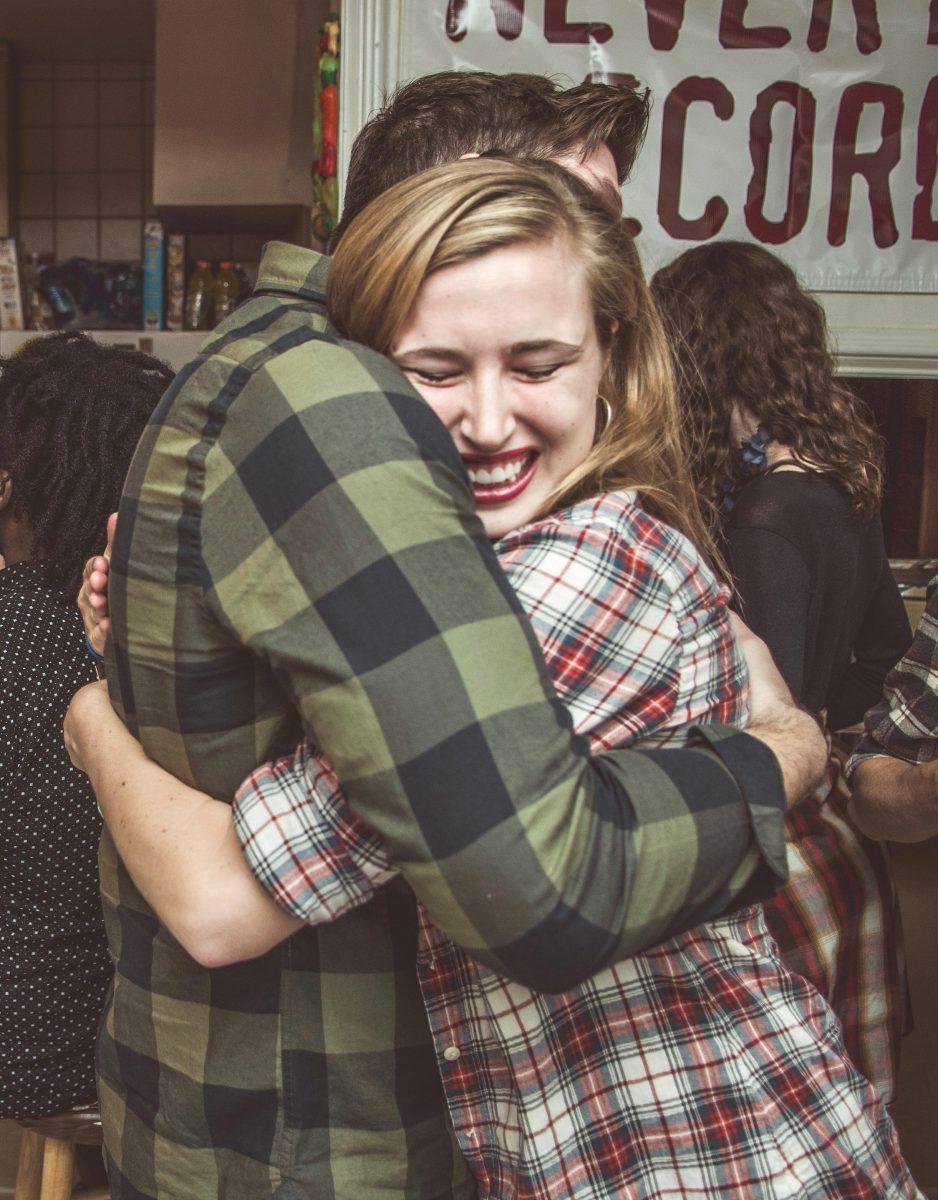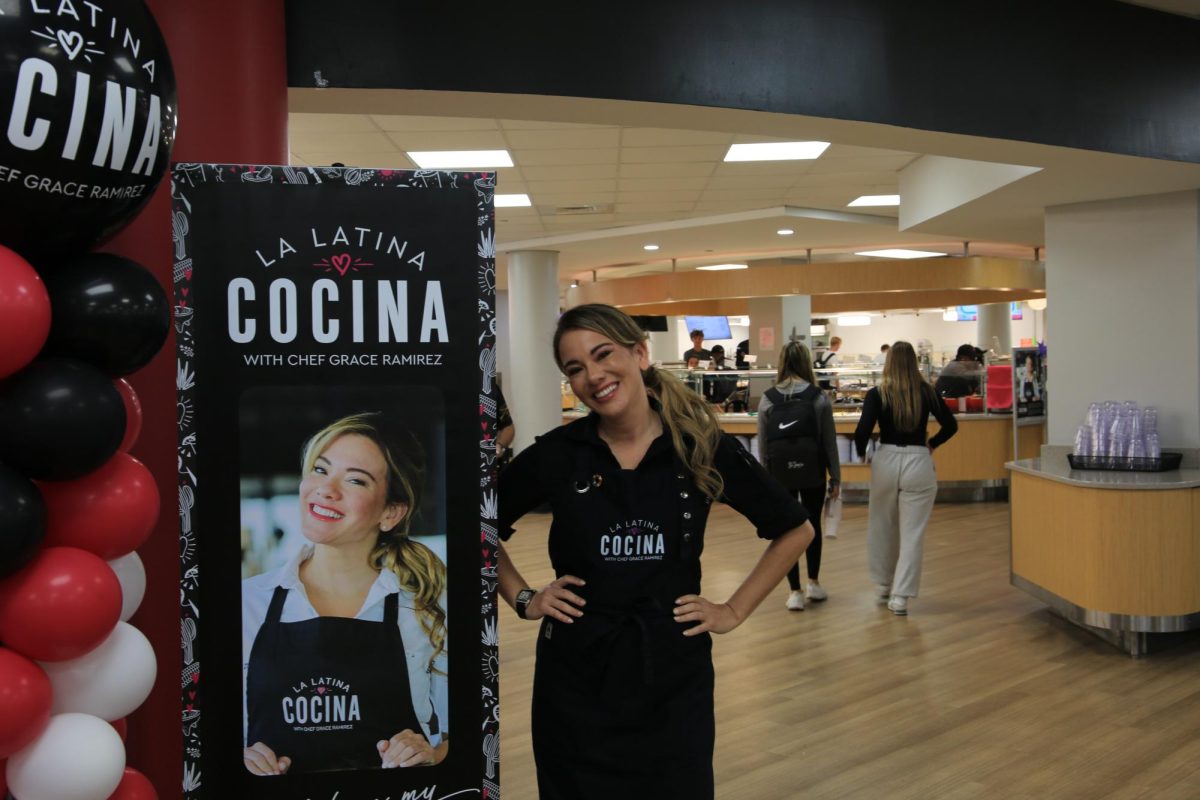As a soft snow started to fall, the Campion Dining Hall slowly filled with hungry students. Wearing her burgundy Frida Kahlo sweatshirt, Julia Furey-Bastian ’20 walked in from the darkness, her long blond hair swaying side to side with each step.
The 20-year-old made a hard right toward the Fish Bowl, a glassed-off section of the dining hall often filled with students looking for a quiet space to chat. On the far left sat two of her best friends, Peter Ferris ’18 and George Fenton ’18.
All three had attended a Christmas dinner at Fenton’s house on Dec. 11. At the party, Furey-Bastian came up to them and put her arms around them. “I miss us,” she told them jokingly, and for the next two days, the men repeated it every time they saw her.
On Dec. 13, the three friends grabbed their food from the dining hall, Furey-Bastian collecting a vegan-friendly plate of chickpeas and fruit, and sat along the windows that look out on the parking lot in front of Sourin Hall. They buckled in for their typical Campion dinner talk, spending just under an hour discussing a range of topics in an effort to avoid thinking about finals.
Furey-Bastian had two finals the next day, one in math and one in philosophy.
She would never take them.
Instead, at 11 p.m. that night, her professors would be asked if they had evaluated enough work to give her a grade for the semester because she would not be able to take any more exams.
A double philosophy and religious studies major, Furey-Bastian took five classes last fall: math, Logic, Indian Buddhism, a philosophy course that is part of the Inside-Out Prison Exchange Program, and an English course that trains students to be tutors in the Writing Center.
In lieu of a final exam for her English course, Furey-Bastian had a 10 a.m. meeting on Dec. 13 with Lindsay Norton ’20, Mary McDermott ’20 and Jenny Spinner, Ph.D., associate professor of English and director of the Writing Center. As a final project for Spinner’s course, Furey-Bastian and her group proposed the Writing Center begin offering conversation groups for international students to help improve their writing.
While Norton and McDermott focused on statistics in the research phase of the project, Furey-Bastian focused on the human side, the women remembered. Students are more than just the papers they need help with. They are people, and Furey-Bastian pushed that point.
Furey-Bastian and her group members continued to edit their final project on Google Docs throughout the day. McDermott and Norton noticed Furey-Bastian making revisions to the document that afternoon. Several weeks later, when Spinner asked if Furey-Bastian remembered the project, Furey-Bastian said she wasn’t sure.
At dinner in Campion, Furey-Bastian, Fenton and Ferris spent part of their time discussing how they all had been bullied as children. They had these kinds of detailed conversations all the time. Whatever came up, no matter how abstract, they went with it.
Fenton mentioned he was bullied for having a bad haircut during his youth. He was on his third cup of coffee when Furey-Bastian told her own story about how she had gotten a shorter haircut when she was young. She hated having short hair and vowed never to have it again.
“That was one of the last things she told us,” Fenton said.
Vivian Milan ’18 was one of the last people to see Furey-Bastian before she attempted to cross City Avenue that night. Milan, like Furey-Bastian, was grabbing a quick bite to eat in Campion. She was eating with Julian Zuzarte ’18 when Furey-Bastian stopped by to say hello and see how finals were going.
The next day, Zuzarte called Milan and asked her to come to Wolfington Hall. He said he had something to tell her. She had a hunch what he was going to say.
On the walk over, she happened to be listening to the Beatles song “A Day in the Life.” The second-to-last line of the song reads, “Now they know how many holes it takes to fill the Albert Hall.”
Some time before 6 p.m., Furey-Bastian left the dining hall to meet her cousin Patrick Bastian outside St. Albert’s Hall, off of Lapsley Lane on the Merion side of campus, where Furey-Bastian lived. While crossing City Avenue, she was struck by a vehicle and severely injured. She suffered extensive injuries, including intensive brain trauma and multiple rib and facial fractures.
Furey-Bastian’s room in St. Albert’s was on the first floor. Victoria Tralies ’18 was her RA and knew Furey-Bastian best from their work in the Writing Center.
Tralies recalled Furey-Bastian’s family members coming to collect personal items from her room before Tralies left to go home for winter break.
“It was really eerie seeing everything the way that it was,” Tralies recalled.
Instead of being on campus for the spring semester, Furey-Bastian is in a rehabilitation hospital in a Philadelphia suburb. Her head was shaved after the first of two brain surgeries, and her hair is just beginning to grow back. She took a few steps, with assistance, for the first time last week and has little short-term memory.
But she still remembers her friends, who visit her regularly, especially Ferris and Fenton. Initially communicating only via sign language, Furey-Bastian has improved to where the three friends can resume their storytelling.
For a while, when Furey-Bastian was still in a coma, Fenton and Ferris would talk to her as if she could hear them. “I miss us,” they would say to her.
Last week, Fenton visited Furey-Bastian with a Scrabble game in tow. He thought it would be a good way to pass the time and keep her mind active.
“It felt like we were just hanging out with her, and she just happened to be in the hospital,” Fenton said. “Her personality was there and [she was] even playing around with the idea that she forgets things.”
At St. Joe’s, Furey-Bastian never lost her focus on other people, or on the social justice issues that mattered to her. She moved in early before the start of her first year to complete the Philadelphia Service Immersion Program (PSIP). Paul Klingsberg Ph.D., professor of mathematics, was the faculty member who worked with her PSIP group.
“I met everybody, but she made it a point to really get to know me,” Klingsberg said. “We chatted at great length that day. I was most impressed with her.”
Since their first meeting, Klingsberg and Furey-Bastian kept in contact, catching up whenever they saw each other on campus. Klingsberg also participated in the SJU March For All in January 2017, which Furey-Bastian helped organize in support of immigrants.
“She cares a lot about people, both friends and strangers, and I was very taken with that,” Klingsberg said.
Last fall, as a sophomore, Furey-Bastian was one of the youngest students accepted for the Inside-Out course. Each week she visited the Philadelphia Industrial Correctional Center (PICC) to attend a class alongside incarcerated students. Normally, older St. Joe’s students are chosen to participate, but because of her compelling interview, Furey-Bastian was given a spot in the class, according to Jamie Hebbeler Ph.D., associate professor of philosophy.
“I was personally lucky enough to have been riding shotgun next to her every Wednesday to and from PICC as she navigated our massive 12-passenger van through the guts of the city,” Hebbeler said.
Furey-Bastian wasn’t new to driving through the city. During her second semester at St. Joe’s, she had driven every Tuesday to do service at HopeWorks N’Camden in Camden, New Jersey, as part of a service learning course taught by Dan Joyce, S.J., executive director of mission programs.
In Camden, Furey-Bastian and her classmate and service partner, Emily Sokolowski ’20, were assigned to a job called “dreams.” They met with underprivileged kids and gave them time to tell their stories and work through their difficult experiences.
“She was able to make these kids who really don’t have anybody come out of their shells,” Sokolowski said.
Week after week traveling to Camden, the women grew closer. During their trips, the two would talk about everything from service to tattoos. They shared a tight bond, one that only grew stronger when seven months later, Sokolowski would help save Furey-Bastian’s life in the middle of City Avenue.
On Dec. 13, Sokolowski left the Chapel of Saint Joseph around 6 p.m. She was walking to Boland Hall to develop photos she had taken while in the chapel. Instead of crossing over McShain Bridge as she often did, Sokolowski walked up City Avenue to cross at the Lapsley Lane intersection.
As she got closer to the light, Sokolowski saw something in the road. The traffic signal was red, and cars were stopped.
“I started to walk a bit faster,” Sokolowski remembered. “Something’s telling me something’s not right, so I started running.”
Sokolowski realized what was in the road – a body.
When the light turned green, cars started to swerve around the figure in the street. Sokolowski threw her backpack and camera onto the Barbelin Hall lawn and ran into the road.
Initially Sokolowski didn’t understand why the woman was in the street. Then she noticed glass covering the woman and the area, and she realized the woman had been hit by a car.
Because of her work at the Kinney Center for Autism Education and Support, Sokolowski is CPR-certified and knew how to stabilize the woman in the road. She called 911, and the dispatcher walked her through exactly what to do.
After an off-duty paramedic was flagged down, Sokolowski had the help she needed to flip the woman. Together Sokolowski and the paramedic turned the woman over, keeping her stable and getting her on her back to further assess her injuries. Even after they flipped her, Sokolowski didn’t recognize the woman’s face.
It wasn’t until the paramedic told Sokolowski that the woman had a tree tattoo on her neck that Sokolowski realized she was working to save the life of her classmate, service partner and friend.
The next time Sokolowski saw Furey-Bastian was in the ICU at Thomas Jefferson Hospital.
“When I went to go see her, I remember thinking she looked good to me after seeing her in the road on Wednesday night,” Sokolowski said. “I saw her every week after that.”
It was six weeks before Milan saw Furey-Bastian again.
“I honestly didn’t know what to expect,” Milan said.
On a Sunday morning in late January, Milan exited the elevator doors on the fourth floor of the rehabilitation center, along with Tralies and Spinner. Milan sat in a plastic hospital chair in front of the elevator doors for an hour, anxiously waiting to see Furey-Bastian, who was in a therapy session when the women arrived to visit her.
When the elevator doors opened, a tall woman in a wheelchair with one broken leg elevated and stitches criss-crossing her stubbled head exited the elevator. Furey-Bastian’s father pushed his daughter towards the visitors.
One by one the students re-introduced themselves. There was a pause of silence as they waited to see if Furey-Bastian recognized them.
Furey-Bastian opened her mouth slightly, looked at Milan, and softly said, “Hi, Viv.”
Dyan Furey, Furey-Bastian’s mother, is keeping a blog on her daughter’s progress at meaningthroughtrauma.com















































